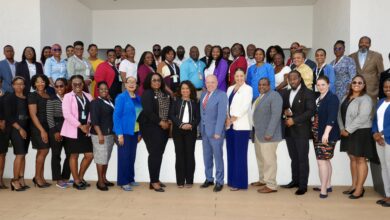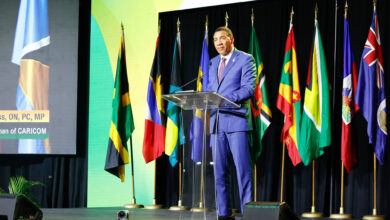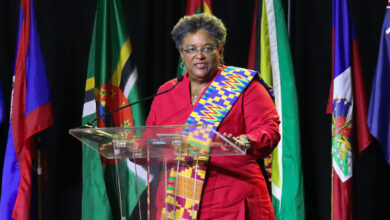Regional stakeholders have made progress with the development of a Regional Migration Policy, the focus of a workshop on migration in the Caribbean, convened 1-3 November 2023 at the United Nations House, Bridgetown, Barbados.
The workshop was facilitated by the CARICOM Secretariat and the CARICOM Implementation Agency for Crime and Security (CARICOM IMPACS) in collaboration with the International Organization for Migration (IOM) and supported by the EU-funded Building Migration Partnerships programme and MIRAC funds.
Previously, stakeholders deliberated on the Policy at a two-day workshop convened by the CARICOM Secretariat in collaboration with IOM on 24 and 25 August 2023 in Bridgetown.
Regional stakeholders involved in the development of the Policy include representatives from the CARICOM Standing Committee of Chiefs of Immigration (CICC), Caribbean Development Bank (CDB), Caribbean Public Health Agency (CARPHA), Regional Security System (RSS), Caribbean Aviation Safety and Security Oversight System (CASSOS); the Caribbean Disaster Emergency Management Agency (CDEMA), the Organization of Eastern Caribbean States (OECS), the Government of the United States, and United Nations Organizations with cross-cutting responsibility for migration.
Addressing participants, Mr Sherwin Toyne-Stephenson, Programme Manager, Crime and Security, CARICOM Secretariat, emphasised the importance of a Regional Migration Policy focused on development. Mr Patrice Quesada, Coordination Officer for the Caribbean, IOM Caribbean, advocated for stakeholders to utilise the Global Compact for Migration (GCM) to guide the process. He stated, “The Global Compact for Migration is the highest level of consensus ever reached among all the Member States of the UN System on the migration issue.”
Workshop participants were divided into Multi-stakeholder Expert Thematic Advisory Groups to review the GCM and deliberate on aspects necessary for the Regional Migration Policy. CARICOM Heads of Government mandated the development of the Policy in 2019 at the 19th Special Summit on Crime and Security in Port-of-Spain, Trinidad and Tobago.
Multi-stakeholder Expert Thematic Advisory Groups
Day 3 encompassed in-depth deliberations by the Advisory Groups on the following three (3) aggregated thematic areas: (a) Border Management Justice and protection, (b) Labour Migration, Social and Economic Development, (c) Climate Change and Adverse Migration Drivers. These formed the basis for collective technical analysis to determine the gaps and attendant priorities as the groups collectively started the process of drafting a framework with precise objectives and actions.
Ms Joycelyn Hughes, Border Security Affairs Specialist, CARICOM IMPACS, advised that the Advisory Groups were “on target with the Roadmap”. She highlighted that one of the major milestones was the inaugural meeting of the Migration Steering Committee chaired by Mr Toyne-Stephenson. The Committee’s role is to ensure the Heads of Government mandate is reflected accurately in the Policy, including the critical priority of sustaining the development needs of the Region’s citizens. This framework will be placed on the proposed Agenda for the Forty-sixth Regular Meeting of the Conference of Heads of Government of CARICOM for endorsement.
The next steps include hiring an expert to work on the completion of the framework and capacity building within individual CARICOM Member States to develop their national migration groups. Collectively, these immediate steps will ensure that the impending policy will deliver sustainable priority actions at the regional and national levels.
The central goal is the development of a Migration Policy that accurately reflects the needs of Member States and prioritises the Region’s economic, social and cultural growth.
Helpful links:
Regional Policy Being Developed to Address Migration Priorities, Challenges and Opportunities
Global Compact for Migration
https://www.iom.int/global-compact-migration
International Organization for Migration






